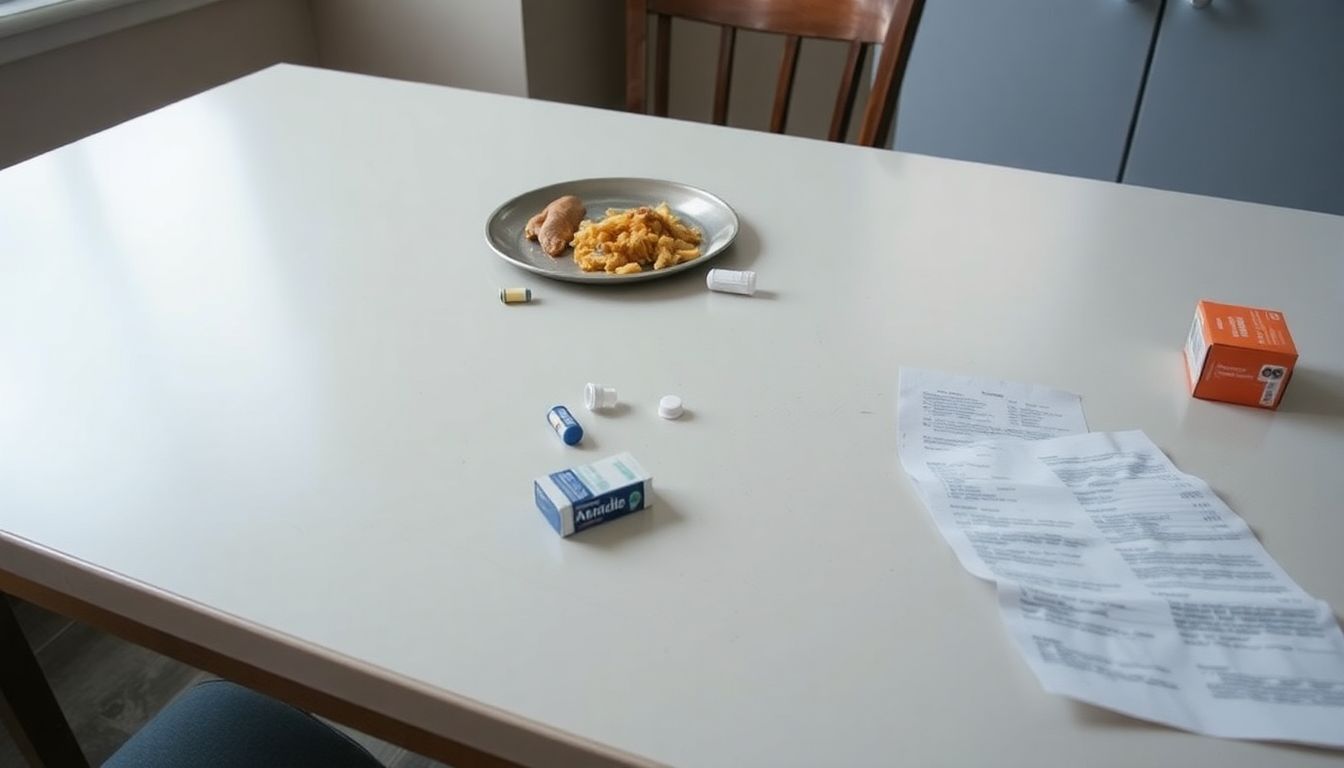Stomach troubles can be frustrating, especially when there’s no clear cause. Issues like abdominal pain or acid reflux might point to problems in the digestive system, but answers aren’t always easy to find.
Thank you for reading this post, don't forget to subscribe!This guide will offer simple tips to improve your digestive health and ease discomfort. Keep reading for practical solutions you can try today!
Key Takeaways
- Stomach troubles like pain, bloating, and indigestion can result from triggers like spicy foods, fatty meals, or fast eating. IBS affects up to 15% of adults and may cause irregular bowel movements.
- Eating smaller meals more often and avoiding trigger foods improves digestion. Adding fiber (25g for women, 38g for men) supports smoother digestion. Stay hydrated with 60–80 ounces of water daily.
- Stress harms the digestive system. Mindfulness, meditation, and better sleep (7–9 hours per night) lower gut issues such as acid reflux or IBS symptoms.
- Herbal teas like ginger or peppermint reduce gas, nausea, and cramping. Avoid high-fat dishes or carbonated drinks that worsen acid reflux.
- Seek a doctor if you experience sharp stomach pain over two days or see blood in vomit/stool—this could mean ulcers or serious conditions needing urgent care!
Common Symptoms of Unexplained Stomach Troubles

Stomach problems can show up without a clear cause and leave you feeling confused. These issues often disrupt daily life, causing discomfort that can be hard to explain.
Abdominal pain
Abdominal pain often strikes during or shortly after meals. It can feel like burning, cramping, or pressure in the stomach area. Functional dyspepsia is a common cause and brings discomfort along with bloating and nausea.
This condition might occur within 30 minutes of eating.
Certain foods like spicy dishes, fatty foods, or dairy products can trigger sharp pain. Underlying conditions such as irritable bowel syndrome (IBS), acid reflux disease, or peptic ulcers may also lead to recurring pain.
If accompanied by vomiting or other symptoms, it’s essential to address these issues promptly.
Discomfort doesn’t always mean something serious—but persistent pain needs attention.
Gas and bloating
Pain and discomfort often come with gas and bloating. These issues can result from trapped air in the digestive system, causing swelling or fullness in your belly. On average, people pass gas 13 to 21 times daily—this is normal.
But excessive gas or constant bloating may point to underlying problems like lactose intolerance, irritable bowel syndrome (IBS), or celiac disease.
Bloating affects up to 90% of those with IBS and can also occur during menstrual cycles due to hormonal changes. About 75% of women experience this at some point each month. Carbonated beverages, fatty foods, spicy dishes, and dairy products are common triggers for many people.
Eating too fast might worsen symptoms by swallowing excess air. To ease discomfort, try eating smaller meals more slowly while avoiding trigger foods that upset your stomach.
Indigestion and heartburn
Indigestion feels like discomfort or burning in the upper stomach. It can come with bloating, nausea, and a feeling of fullness after eating small amounts. Heartburn often causes sharp chest pain that rises to your throat or jaw.
This happens when stomach acid flows back into the esophagus.
Frequent heartburn may mean GERD (gastroesophageal reflux disease). GERD symptoms include coughing, bad breath, sore throat, or trouble swallowing. Over time, it may lead to problems like esophagitis or Barrett’s esophagus.
Avoid trigger foods like spicy dishes, fatty snacks, and carbonated drinks to reduce these issues. Smaller meals help too!
Irregular bowel movements
Constipation means having fewer than three bowel movements in a week. It can cause bloating, gas pain, and stomach discomfort. On the other hand, diarrhea comes with loose stools, cramps, and watery bowel movements.
Both can disrupt daily life and may signal issues like irritable bowel syndrome (IBS), affecting up to 15% of adults.
Adding soluble fiber from fruits or oats might help if you feel constipated. Fiber supplements are another option for relief. Stool softeners or osmotic agents like polyethylene glycol also ease constipation by drawing water into the stool.
Diarrhea may require loperamide (Imodium) to slow your intestines down quickly—a trip to the doctor is a good idea if symptoms last too long or worsen! Making small changes can improve your digestive health, leading to better days ahead!
Lifestyle Changes to Improve Digestive Health
Simple changes—like eating right and staying hydrated—can work wonders for your digestion. Keep reading to learn easy tips!
Adjust your diet
Cut down on trigger foods like spicy foods, fatty meals, and carbonated drinks. These can upset your stomach or worsen conditions like acid reflux or IBS. People with lactose intolerance should try lactose-free milk or products such as Lactaid to avoid discomfort.
Increase soluble fiber intake for smoother digestion—25 grams daily for women, 38 grams for men works well. Foods high in this include oats, beans, and fruits like apples. For bloating issues caused by IBS, a Low-FODMAP diet helps most patients (50%–80%) feel better.
Probiotics and prebiotics also support gut health by balancing the digestive system’s microbiome.
Eat smaller, more frequent meals
Switching to smaller, more frequent meals can help ease digestive problems. Eating 4 to 5 meals a day instead of three large ones prevents overloading your stomach and reduces acid reflux.
It’s easier for the digestive system to handle smaller portions, which may lessen abdominal pain or bloating.
Avoid eating large meals close to bedtime. Give it at least 2–3 hours before lying down after eating. This allows your body time to digest food properly and avoids issues like heartburn or indigestion caused by lying flat too soon after eating.
Stay hydrated
Drink 60-80 ounces of water daily. This keeps your digestive system running smoothly and helps prevent constipation. Dehydration can make stool harder to pass, leading to discomfort and irregular bowel movements.
Older adults often feel less thirsty, increasing their risk of dehydration. Carry a water bottle as a reminder to sip throughout the day. Avoid too many carbonated beverages or alcohol, which can upset your stomach further.

How to Make Fast Food Healthier: Smart Swaps for a Better Meal
It’s easy to enjoy fast food while staying healthy. Small changes can make a big difference for your digestive health.
- Choose smaller portions, like side salads or grilled proteins, instead of larger combo meals. This can cut down on stomach pain from overeating or fatty foods.
- Pick grilled items over fried ones. Grilled chicken or fish has less fat and is easier on the stomach than deep-fried options.
- Ask for dressings and sauces on the side. Many contain high-fat ingredients that may irritate acid reflux or cause indigestion.
- Skip sugary drinks like sodas, sweet teas, or milkshakes. Switch to water, unsweetened tea, or carbonated beverages without added sugar to avoid extra calories and bloating.
- Replace fries with better sides like baked potatoes, fruit cups, or steamed vegetables when available. These provide dietary fiber without the heavy oils.
- Plan ahead by checking nutrition info online before ordering. Look for options high in protein but low in sugar and fat to help control acid production in the digestive juices.
- Avoid double cheese or creamy toppings that are common triggers for upset stomachs and lactose intolerance issues caused by dairy products.
- Stick to whole-grain buns if they’re offered over white bread since they add soluble fiber—helping with bowel movements while avoiding constipation causes.
- Try customizing meals by asking for no added salt or fewer condiments to reduce sodium intake that can lead to inflammation over time.
- Pack homemade snacks for backup when dining out isn’t ideal—air-fried nuggets are a great choice as a healthier alternative!
Stress Management and Its Role in Digestion
Stress affects your digestive system more than you think. High stress can lead to issues like acid reflux, bloating, or stomach pain.
Practice mindfulness or meditation
Meditation and mindfulness help ease stress, which can affect your digestive health. Regular practice reduces anxiety, improves gut motility, and lowers gut inflammation. This keeps issues like irritable bowel syndrome (IBS) or acid reflux under control.
Deep breathing exercises during meditation relax your body and lessen stomach pain caused by tension.
Find a quiet spot to focus on slow breaths for 5–10 minutes daily. Mindfulness encourages you to stay in the moment, reducing worry about future meals or past upset stomach episodes.
These practices balance the mind and digestive system naturally without using stool softeners or medications like proton pump inhibitors.
Get adequate sleep
Poor sleep affects the digestive system. It can worsen gastrointestinal problems like acid indigestion or irritable bowel syndrome (IBS). Around 70 million people in the US face chronic sleep issues, which may lead to irregular eating habits and poor food choices.
Lack of rest increases stress levels and stomach acid production, triggering conditions such as acid reflux or GERD. Aim for 7–9 hours of quality sleep each night to support digestion.
Avoid caffeine, fatty foods, or carbonated beverages before bed—they disrupt your rest and cause upset stomachs.
Home Remedies for Stomach Relief
Simple changes can often ease an upset stomach. Small tweaks in daily habits might bring big relief over time.
Use ginger or herbal teas
Ginger tea soothes an upset stomach and reduces abdominal pain. Its anti-inflammatory properties ease stomach issues like acid indigestion or bloating. Chamomile tea offers similar benefits by calming the digestive system and relieving discomfort.
Peppermint tea works wonders for gas or cramping, thanks to menthol.
These teas are caffeine-free, making them gentle on the stomach lining. For relief from nausea caused by acid reflux or a stomach virus, sip warm ginger tea in small amounts. Herbal teas can also reduce symptoms tied to irritable bowel syndrome (IBS) and other digestive problems like inflammation of the esophagus.
Avoid trigger foods
Spicy foods, fried items, and caffeinated sodas can irritate your stomach. Alcohol often worsens acid reflux or heartburn issues. If you’re lactose intolerant, even small amounts of dairy products like milk or cheese may upset your digestive system.
For those with IBS, beans, onions, and cauliflower might cause excess gas and bloating. High-fat meals also take longer to digest and may trigger abdominal pain or indigestion. Keep a food diary to spot what’s troubling your gut most often.

When to Seek Medical Attention
Stomach pain that won’t go away can mean something serious. If strange symptoms appear, it’s time to visit a doctor.
Persistent or worsening symptoms
Severe stomach pain lasting over 24 to 48 hours needs attention. Sharp or unbearable pain can point to serious issues like a gallbladder attack, intestinal blockage, or even peptic ulcer disease.
Ignoring it may make things worse.
Blood in stool or vomit is a red flag. This could mean inflammation, stomach ulcers, or gastrointestinal conditions like Crohn’s disease. Long-term bloating or sudden chest pain might signal more than basic digestive problems—act quickly if they appear.
Presence of blood in stool or vomit
Blood in stool or vomit is a serious warning sign. It may point to issues like ulcers, inflammatory bowel disease, or cancer of the esophagus. Only about 50% of people with rectal bleeding seek help, often thinking it’s minor.
If you notice red streaks or dark black stools, contact a doctor fast. Vomiting blood could mean conditions like peptic ulcer disease or even food poisoning gone severe. This isn’t something to ignore—prompt care can prevent complications in your digestive system and beyond!
Conclusion
Stomach troubles can be frustrating, but small changes help. Adjust your diet and manage stress to ease discomfort. Pay attention to symptoms that might need medical care. Healthy habits support a happier gut…
and you’ll feel better soon!
For more tips on maintaining your diet even when you’re indulging in fast food, check out our guide on how to make fast food healthier with smart swaps for a better meal.
